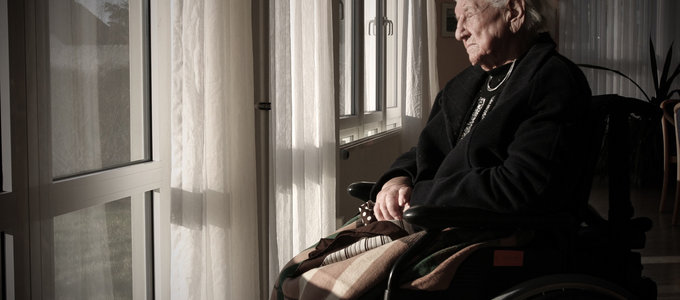Abuse of the Elderly – World Elder Abuse Awareness Day 15th June

Wednesday 15th June 2022 is World Elder Abuse Awareness Day - see more here
What is Elder Abuse?
According to the World Health Organisation’s published factsheet, the definition is:
“Elder abuse is a single or repeated act, or lack of appropriate action, occurring within any relationship where there is an expectation of trust, which causes harm or distress to an older person. This type of violence constitutes a violation of human rights and includes physical, sexual, psychological, and emotional abuse; financial and material abuse; abandonment; neglect; and serious loss of dignity and respect.”
The age of an ‘older person’ is not explicitly defined. However, statistics offered by the WHO and the United Nations (UN) typically refer to people aged 60 years and older.
Domestic Abuse Act 2021 - definition
The Domestic Abuse Act 2021 received royal assent in April 2021 and introduced a statutory definition of domestic abuse in UK law for the first time.
In addition:
-
The definition encompasses people who have been in a relationship or are relatives.
-
Abuse is defined as “physical or sexual abuse, violence or threatening behaviour, controlling or coercive behaviour, economic abuse or psychological, emotional or other abuse”.
The UK Government has confirmed that there is no upper age limit.
Individuals at Risk of Elder Abuse
The risk areas for the abuse of an older person occur in:
-
Relationships
-
Community; and
-
Socio-cultural levels.
Examples:
-
Individual: poor physical and mental health of the victim; mental disorders and alcohol and substance abuse in the abuser; and gender.
-
Relationship: shared living situation; spouse; adult children; abuser dependency on the older person; history of poor family relationships; increase in women entering the workforce meaning caring for older relatives becomes a greater burden.
-
Community: social isolation of caregivers and older persons, due to loss of physical or mental capacity, or loss of friends and family members.
-
Socio-cultural: ageist stereotypes; erosion of generational bonds in a family; systems of inheritance and land rights; migration of young couples; lack of funds to pay for care.
The WHO highlighted that the consequences of abuse can be especially serious for older people.
Abuse can lead to long-term psychological problems; convalescence is likely to take longer; and even minor injuries can cause permanent damage or death.
The domestic abuse charity, Safe Lives, reported that older victim-survivors may face additional social, cultural and physical challenges. Older victim-survivors can experience:
-
systematic invisibility
-
long-term abuse and dependency issues
-
generational attitudes about abuse making domestic abuse hard to identify
-
increased risk of adult family abuse
-
services not being targeted at older victims, and not always meeting their needs; and
-
the need for more coordination between services.
How widespread is Elder Abuse?
The WHO noted the findings of a study published in 2017 that estimated almost 1 in 6 people 60 years and older experienced abuse in community settings that year, although the true picture is likely to be far higher due to older people’s fears around reporting abuse to family, friends, or the authorities.
A report by charity Hourglass found that nearly a third of UK residents surveyed did not see acts of domestic violence directed at an older person as abuse, including inappropriate sexual acts, as well as pushing, hitting, or beating an older person.
A 2020 report by Age UK estimated around 180,000 women and 98,000 men aged 60 to 74 were victim-survivors of domestic abuse in England and Wales in 2018/19, based on CSEW data. It went on to note that these statistics were collected before the Covid-19 pandemic, “which will have exacerbated the problems facing older victims”.
The impact of the Coronavirus pandemic
The Age UK report said:
“Many older victims will have faced an impossibly cruel situation in which they were afraid to go out for fear of contracting a life-threatening illness, and afraid of staying in for fear of being abused at home.”
And commented on the Coronavirus impact of Elder Abuse:
-
93% of deaths in England have been of people aged 60+, meaning older people in need of care and support have been rendered “acutely vulnerable”.
-
Enforced isolation had exacerbated many of the existing challenges older people face in accessing essential goods, healthcare and other services.
-
Lockdown had increased the risk of older people experiencing domestic abuse, especially in relation to financial or care dependencies and barriers to reporting abuse.
-
The Women’s Aid Foundation reported 61% of women living with their abuser in lockdown said the abuse had worsened and 67% said that Covid-19 had been used as part of the abuse.
Hourglass’ earlier 2020 surveys of over 2,500 adults found that 1 in 5 UK residents surveyed (22%) had personal experience of abuse as an older person aged 65+ or knew an older person who had been abused.
Hourglass suggested this indicated almost 2.7 million older people may have been affected by domestic abuse across the country in 2020. It also found 53% of those surveyed believed that the abuse and neglect of older people had increased as a result of lockdown and noted a “marked increase in calls to [their] helpline since the first national lockdown”.
The Government response
The Domestic Abuse Act 2021 expanded the definition of those “personally connected” to the victim to include relatives, as well as intimate or ex-partners. In addition, it introduced a duty on local authorities in England to provide support to victims of domestic abuse in refuges and other safe accommodation. It also sought to protect all victims who are abused or controlled by a relative.
The Government has put a number of measures in place to support domestic abuse victim-survivors during the pandemic, these include a Home Office communications campaign to raise awareness of elder abuse, allocating £2 million for online support services and helplines, and additional government measures included awarding funding for research.

Sarah Townsend, Solicitor, Lawson West, Leicester
“Elder Abuse is more common than you think. I have previously advised on a family case where an elderly woman was terrified to be alone with her own son. He would come and go from her property, where he had grown up with her, however, he would use both emotional and physical violence towards her. This lady was over 60 and in poor health. I was able to assist her in obtaining a Non-Molestation Order against her son, which also prevented him from returning to her home. - This order offered her the protection she required and had her son breached this; she was able to call the police as breaching a Non-Molestation Order is an arrestable offence.
During the pandemic people have been forced to remain living in situations where they are at risk of/or are suffering abuse. Furthermore, they may have not been able to seek support due to being with their abuser all the time. It is important that support is provided, and people are able to protect themselves from this abuse. We must also not forget that abusers are not necessarily partners, but it could their family member.
Although as a firm Lawson West does not provide Legal Aid, if you have been affected by this article and would like to speak to an experienced solicitor about your own situation, you can contact our Family Law team in total confidence. Contact Us.
Further reading:
-
Hourglass, ‘Get support: Hourglass services’
-
House of Commons, Domestic Abuse: Support for Victims and Survivors
-
Hourglass, Response to Domestic Abuse Bill
-
Age UK, Safeguarding Older People from Abuse and Neglect, December 2020

